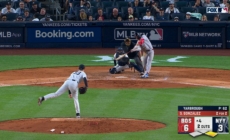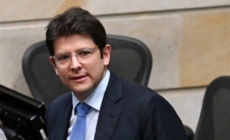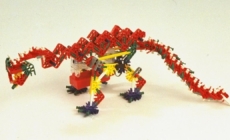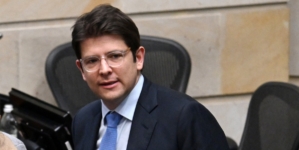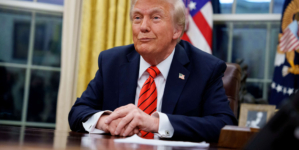-
How to Watch Edmonton Elks vs BC Lions: Live Stream CFL, TV Channel - 32 mins ago
-
DraftKings UFC Promo Code: Claim Bet $5, Win $300 Bonus For UFC 316 Card - about 1 hour ago
-
Red Sox's Romy Gonzalez cranks two-run home run to extend lead over Yankees - about 1 hour ago
-
Miguel Uribe, leader of Colombian right opposition, shot in Bogota - about 1 hour ago
-
Trump’s Pardon Spree May Not Be Over Yet: What to Know - 2 hours ago
-
LIV Golf Virginia: Anirban Lahiri charges to lead after stellar 64 in Round 2 - 2 hours ago
-
Toys caught in the crosshairs of Trump’s tariffs - 2 hours ago
-
Who Are the Suspects Charged in North Carolina Deadly Mass Shooting? - 2 hours ago
-
Miley Cyrus stuns in sheer crystal dress at New York film festival - 3 hours ago
-
Sovereignty wins 2025 Belmont Stakes, third and final leg of Triple Crown - 3 hours ago
Mossad Planted Explosives in Iran Nuclear Centrifuge Admits Official
A senior Iranian official has acknowledged for the first time that Israel’s Mossad intelligence agency planted explosives in centrifuge platforms used in Iran’s nuclear enrichment program.
Mohammad Javad Zarif, a former foreign minister and current vice president for strategic affairs, made the disclosure during an interview with a reformist-aligned Iranian organization, which seeks to change Iran’s Shiite theocracy from within. His remarks shed new light on the depth of Israel’s operations against Tehran’s nuclear ambitions.
Why It Matters
Iran’s nuclear program, which it insists is peaceful, has become a flashpoint in broader geopolitical disputes since the United States’ 2018 withdrawal from the Joint Comprehensive Plan of Action (JCPOA). The collapse of the agreement allowed Tehran to enrich uranium to 60 percent purity, significantly closer to the 90 percent needed for weapons-grade material.
-/AFP via Getty Images
What To Know
Mossad’s operations against Iran’s nuclear infrastructure have been at the forefront of regional tensions for over a decade. In July 2020, a blast at Natanz destroyed advanced centrifuge assembly lines, followed by another attack in April 2021 that targeted underground enrichment facilities. Both incidents were widely attributed to Israel.
Outgoing Mossad chief Yossi Cohen all but confirmed these attacks in a 2021 interview with Israeli television, stating that agents had supplied Iran with “marble foundations” embedded with explosives for its centrifuge platforms. These admissions align with Zarif’s acknowledgment, adding new weight to long-standing claims of Israeli sabotage.
Mossad Exploits Iran’s Weak Supply Chain
Zarif explained that Mossad exploited Iran’s reliance on intermediary suppliers, a consequence of international sanctions, to introduce sabotage materials into the nuclear supply chain.
“If the Zionist regime can infiltrate one of the dealers, then it can do anything and install anything,” Zarif said.
Israeli Prime Minister Benjamin Netanyahu has pledged that Israel will prevent Iran from developing nuclear weapons, raising the likelihood of preemptive strikes.
The vulnerabilities highlighted by Zarif echo findings by the International Atomic Energy Agency (IAEA), which has reported Tehran’s deployment of advanced IR-6 centrifuges capable of accelerating uranium enrichment. The IAEA has also expressed concerns over restricted access to Iran’s nuclear sites and unanswered questions about undeclared nuclear material.
Beyond technical concerns, Iran’s broader military buildup adds to regional unease. This week, the Iranian army announced the deployment of 1,000 drones with advanced stealth and anti-fortification capabilities. These developments coincide with Iran’s recent strikes on Israel, which Tehran described as retaliation for earlier attacks.
What People Are Saying
Mohammad Javad Zarif, a former foreign minister who serves as vice president for strategic affairs for reformist President Masoud Pezeshkian: “This is part of the damage of sanctions, that you are forced to receive (purchases) through multiple dealers instead of buying from a factory directly.
“If the Zionist regime can infiltrate one of the dealers, then it can do anything and install anything.”
He added: “For instance, our friends at the Atomic Energy Organization (of Iran) had purchased a platform for centrifuges in which (the Israelis) had installed explosive material.”
Iranian President Masoud Pezeshkian told NBC News that Iran is open to dialogue regarding cooperation with the second Trump administration.
“The problem we have is not in dialogue,” he said. “It’s in the commitments that arise from talk and dialogue that we’ll have to commit to.”
When Iran held talks with major powers about its nuclear program, “we upheld all the commitments that we had to commit to,” he said in the interview aired Tuesday. “But unfortunately, it was the other party that did not live up to its promises and obligations.”
What Happens Next
As ceasefire talks between Israel and Hamas reportedly progress, attention has shifted to Iran’s nuclear program. Following the 2018 U.S. withdrawal from the international accord restricting Tehran’s nuclear activities, Iran has exceeded all agreed-upon limits.
The impending return of U.S. President-elect Donald Trump to the White House on January 20 is expected to reignite tensions. Trump has signaled plans to revive his “maximum pressure” campaign against Iran, a strategy designed to economically isolate Tehran and curb its nuclear ambitions.
This article includes reporting from The Associated Press.
Source link


